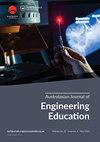Defining the capabilities required to teach engineering: Insights for achieving the Australian sector’s future vision
Q1 Social Sciences
Australasian Journal of Engineering Education
Pub Date : 2023-01-02
DOI:10.1080/22054952.2023.2214461
引用次数: 2
Abstract
ABSTRACT Professional engineering practice is being transformed by technological developments, globalisation, and changes in societal expectations. In response, approaches to engineering education must advance to better prepare graduates for the demands of industry. However, the criteria currently used by universities to appoint and promote academics do not appropriately prioritise teaching quality, which impedes educational quality enhancement. This study sought to refine the categories of teaching capability proposed in the Engineering 2035 Project (which reviewed the state of Australian engineering education), given these categories lacked the detail necessary to inform policy. Transcripts of interviews with 21 engineering educators were thematically analysed to identify the key skills required of engineering educators. Mapping of interview themes to the seven capabilities proposed in the Engineering 2035 Project revealed gaps in three pedagogically-driven areas related to communicating complex engineering concepts to actively engage students, creating empathetic learning environments, and subject management. New extended descriptors for ten teaching capabilities were developed. We argue that these capabilities must be valued within universities to drive improvement in engineering education quality. Thus, the proposed capability descriptors should be used to inform criteria for recruiting and promoting academics, guide professional development strategy, and evidence educator quality during accreditation processes.定义工程教学所需的能力:实现澳大利亚部门未来愿景的见解
专业工程实践正在被技术发展、全球化和社会期望的变化所改变。因此,工程教育的方法必须推进,以更好地为毕业生做好工业需求的准备。然而,目前大学聘任和提拔学者的标准没有适当地优先考虑教学质量,这阻碍了教育质量的提高。鉴于这些类别缺乏为政策提供信息所需的细节,本研究试图完善“工程2035项目”(该项目回顾了澳大利亚工程教育的现状)中提出的教学能力类别。对21名工程教育工作者的访谈记录进行了主题分析,以确定工程教育工作者所需的关键技能。将面试主题映射到工程2035项目中提出的七个能力,揭示了三个教学驱动领域的差距,这些领域与传达复杂的工程概念以积极吸引学生、创造移情学习环境和主题管理有关。为十个教学能力开发了新的扩展描述符。我们认为这些能力必须在大学内部得到重视,以推动工程教育质量的提高。因此,建议的能力描述符应该用于通知招募和提升学者的标准,指导专业发展战略,并在认证过程中证明教育者的质量。
本文章由计算机程序翻译,如有差异,请以英文原文为准。
求助全文
约1分钟内获得全文
求助全文
来源期刊

Australasian Journal of Engineering Education
Social Sciences-Education
CiteScore
6.40
自引率
0.00%
发文量
8
 求助内容:
求助内容: 应助结果提醒方式:
应助结果提醒方式:


